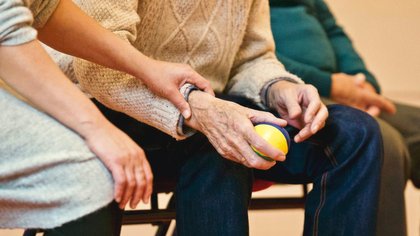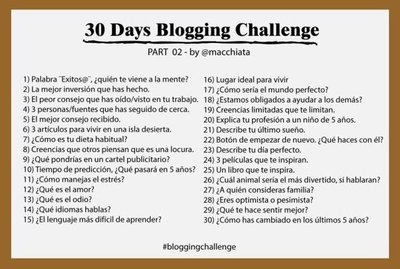
Dieciochoavo día del 2do reto / Eighteenth day of the 2nd challenge

Espanish
Cada semana vamos caminando hacia un nuevo tema que nos ofrecen en los retos del Blogging Challenge, poniendo a prueba nuestra capacidad de análisis, e invitándonos a compartir nuestras cosas personales con esta gran comunidad. No siempre se puede hacer tan bien como uno quisiera pero con toda seguridad afirmo que vale la pena el esfuerzo que podamos hacer para participar y dar lo mejor de nosotros en estas iniciativas tan interesantes e innovadoras.
Y sin más preámbulos pasemos a ver las cosas que tengo preparadas para todos en esta nueva publicación.
English
Every week we are walking towards a new topic offered to us in the Blogging Challenge, testing our analytical skills, and inviting us to share our personal stuff with this great community. You can't always do as well as you'd like, but I'm sure it's worth the effort to participate and do our best in these interesting and innovative initiatives.
And without further ado, let's take a look at the things I have in store for everyone in this new publication.


Foto de Marcus Aurelius en Pexels - Photo of Marcus Aurelius in Pexels
Espanish
Ciertamente las cosas que hacemos o que dejamos de hacer tienen un impacto en nuestras vidas y en el mundo entero, tanto a largo plazo como en el corto plazo, partiendo de ahí la importancia de aprender a pensar antes de actuar rectificando siempre cada uno de nuestros pasos. En este punto podemos observar también que hay actos de poca o nula magnitud que simplemente ocurren y no generan casi consecuencias, como también hay otros actos de inmensas proporciones que pueden generar grandes consecuencias, positivas o negativas según lo acontecido.
Todo esto nos sugiere que hay cosas que podemos hacer para aportar al mundo, contribuyendo a su crecimiento y desarrollo desde cualquier ámbito. En el post anterior mencioné muchos puntos que probablemente citaré aquí porque esa misma preocupación por saber cómo podemos tener un mundo perfecto o uno mejor es la que finalmente nos lleva al camino de ayudar a otras personas, o eso es al menos lo que implica llevar a cabo una tarea titánica como esa.
Es cierto que todos tenemos derechos y deberes, y que lo ideal sería reclamar nuestros derechos y asumir nuestros deberes, pero también es importante tener claro hasta donde llegan cada una de estas realidades, y evitar sobre todo caer en lo subjetivo, dado que estos temas siempre se prestan para que, quien no reflexione sobre estas cosas pueda llamar derecho o deber a cualquier cosa. Estas subjetividades aparte de ser improductivas por llevarnos al autoengaño, pueden hasta ser peligrosas en algunos casos que han sido bastante sonados en el mundo donde se llegan a los extremos con este tema provocando terribles consecuencias.
English
Certainly the things we do or fail to do have an impact on our lives and on the whole world, both in the long term and in the short term, hence the importance of learning to think before we act, always rectifying each of our steps. At this point we can also observe that there are acts of little or no magnitude that simply occur and generate almost no consequences, as well as other acts of immense proportions that can generate great consequences, positive or negative depending on what happened.
All this suggests that there are things we can do to contribute to the world, contributing to its growth and development from any field. In the previous post I mentioned many points that I will probably quote here because that same concern for knowing how we can have a perfect world or a better one is what finally leads us to the path of helping other people, or that is at least what it implies to carry out a titanic task like that.
It is true that we all have rights and duties, and that the ideal would be to claim our rights and assume our duties, but it is also important to be clear about the extent of each of these realities, and avoid falling into the subjective, since these issues always lend themselves to those who do not reflect on these things can call anything a right or a duty. These subjectivities, apart from being unproductive because they lead us to self-deception, can even be dangerous in some cases that have been quite well known in the world where they go to extremes with this issue causing terrible consequences.

Entonces ¿Realmente estamos obligados a ayudar a los demás? ¿Es responsabilidad nuestra hacerlo?
Hay algo que nosotros llamamos libre albedrío, que nos da la capacidad de pensar, razonar y sentir por nosotros mismos permitiéndonos establecer parámetros que nos funcionan. Esto nos ayuda a distinguir entre lo que es bueno y lo que es malo, lo cual no tiene nada que ver con reglas y principios de moralidad que definitivamente es un tema distinto y mucho más profundo. El principal problema que tenemos como seres humanos o seres pensantes es que tendemos a dejarnos llevar por nuestro ego, y lamentablemente la mayoría de las veces es éste quien piensa por nosotros en lugar de tomar nosotros las riendas usando el ego y cualquier emoción para pensar. Pasa bastante seguido que cuando algo no nos gusta mucho o no lo entendemos lo catalogamos según nuestra conveniencia, y en el peor de los casos nos servimos de argumentos sacados de libros y códigos de moral o de cualquier otra materia para interpretarlos según nuestra conveniencia. Creo que muchos podemos estar de acuerdo en que alguna vez hemos caído en este autoengaño con cosas como, “es que tomar muchas gaseosas no es malo porque nos da energía y eso lo dijo el doctor Fulano de tal”, “esta pareja que tengo me ha mentido mucho pero es mi pareja ideal porque nos queremos mucho y según los expertos eso es lo que más importa”, y para el caso de esta pregunta “es que no me ofrezco a ayudar al vecino porque estoy muy ocupado y primero tengo que estar bien yo para poder ayudar a otros”, “es que no ayudo porque ese problema no me afecta a mí y nadie debe meterse en la vida de los demás”, o en un extremo que quizás no todos hacen pero igual ocurre, cuando se invierten los hechos y decimos cosas como “tengo que ayudar a mover el dinero del funcionario tal porque va a hacer una escuela en el barrio” y resulta que lo estamos ayudando a robar desviando los recursos que le dieron para otra cosa o ponemos menos de ese dinero para la obra original y lo demás nos lo quedamos, o cosas como “me tienes que ayudar a decirle a mi amiga que pasó esto y lo otro, porque yo te ayude en el pasado” y resulta que lo que vamos a decir es una mentira. Y así muchas excusas y autoengaños que nos hemos generado bastantes veces en nuestra vida condimentados con buenos o malos argumentos que hacen que nuestro ego nos tape la vista de la realidad.
Confieso que no me gusta para nada cuando algunas personas comienzan a hablar de lo que serían los deberes de cada quién, porque todo lo que dicen se escucha como si fuesen cosas que de verdad hay que hacer de vida o muerte, y la peor parte es que muchas veces uno ni conoce lo suficiente a los personajes como para saber si tienen la suficiente moral para predicar estas creencias. Y cuando revisamos todas estas prédicas encontramos que muchos de estos llamados deberes los hemos dejado de hacer hace poco tiempo y aún no ha pasado nada alarmante. Nadie nos va a apuntar con una pistola en la cabeza para que comamos vegetales si decidimos un día dejar de comerlos porque no nos gustan, y mucho menos nos van a encarcelar por eso. Somos libres de comer lo que queramos, pero eso no va a escapar de la ley natural de causa y efecto, traduciéndose en la factura que nos pasará el cuerpo a largo plazo por dejar de recibir los nutrientes y vitaminas que nos aportan los vegetales, o si hemos preferido comer más carne que vegetales seguramente dentro de varios años nos enfermaremos de artritis o alguna otra cosa parecida. Esa es la diferencia entre los deberes y las cosas obligadas o impuestas.
So are we really obliged to help others? Is it our responsibility to do so?
There is something we call free will, which gives us the ability to think, reason and feel for ourselves allowing us to establish parameters that work for us. This helps us to distinguish between what is good and what is bad, which has nothing to do with rules and principles of morality which is definitely a different and much deeper issue. The main problem we have as human beings or thinking beings is that we tend to get carried away by our ego, and unfortunately most of the time it is the ego that thinks for us instead of us taking the reins using the ego and any emotion to think. It happens quite often that when we don't like something or we don't understand it we categorize it according to our convenience, and in the worst cases we use arguments taken from books and moral codes or any other subject to interpret them according to our convenience. I think many of us can agree that at some time we have fallen into this self-deception with things like, "drinking a lot of sodas is not bad because it gives us energy and that's what Dr. So-and-so said", "this partner I have has lied to me a lot but is my ideal partner because we love each other a lot and according to experts that is what matters the most", and in the case of this question "I don't offer to help my neighbor because I am very busy and I have to be well first to be able to help others", "I don't help because this problem does not affect me and no one should interfere in the lives of others", or in an extreme that perhaps not everyone does but still happens, when the facts are reversed and we say things like "I have to help move the money of such and such official because he is going to build a school in the neighborhood" and it turns out that we are helping him to steal by diverting the resources he was given for something else or we put less of that money for the original work and the rest we keep, or things like "you have to help me to tell my friend that this and that happened, because I helped you in the past" and it turns out that what we are going to say is a lie. And so many excuses and self-deceptions that we have generated many times in our lives, seasoned with good or bad arguments that make our ego block our view of reality.
I confess that I do not like at all when some people start talking about what would be the duties of each one, because everything they say is heard as if they were things that really have to be done for life or death, and the worst part is that many times one does not even know the characters enough to know if they have enough morals to preach these beliefs. And when we review all these preachings we find that many of these so-called duties we have stopped doing a short time ago and nothing alarming has happened yet. No one is going to hold a gun to our heads to make us eat vegetables if we decide one day to stop eating them because we don't like them, let alone jail us for it. We are free to eat whatever we want, but that is not going to escape the natural law of cause and effect, translating into the bill that our body will take in the long run for not receiving the nutrients and vitamins that vegetables provide us, or if we have preferred to eat more meat than vegetables we will surely get arthritis or something else like that in several years. That is the difference between homework and forced or imposed things.


Foto de Matthias Zomer en Pexels - Photo of Matthias Zomer in Pexels
Por lo que entonces una buena respuesta para esta pregunta de si estamos obligados a ayudar a los demás sería un rotundo “no”. Si nos detenemos a analizar objetivamente todo lo que implica el hecho de ayudar y lo que significa podemos encontrar que realmente nada de eso convierte al acto de ayudar a otros en una obligación, pero en cambio sí es uno de los tantos deberes que tenemos en este mundo. Lo que distingue una cosa de otra para mi es quien te cobra esa deuda, porque si te cobra un patrono, un jefe, un vendedor, o cualquier persona que espera algo de nosotros a cambio bajo acuerdo entonces la deuda es de una obligación, y si quien nos cobra realmente es la vida bajo la ley de causa y efecto entonces estamos ante un deber, y ambas cosas tienen la misma importancia pero no la misma urgencia e impulso. Si tenemos que ayudar a alguien porque lo dice un contrato que firmamos entonces ya estamos hablando de una colaboración o servicio que estamos prestando a cambio de algo para nosotros bajo acuerdo, pero aun así tendríamos que catalogar este contexto como una obligación y no como un deber, sin querer decir que no implique algo de deber en tal situación.
Debemos ayudar a otras personas por una gran variedad de razones de peso, todos tenemos algo que aportar a este mundo y necesitamos procurarnos nuestro propio espacio en él, y el acto de ayudar a otros nos garantiza una buena participación en el proceso de desarrollo de nuestro mundo ganándonos la estima y el respeto de la sociedad. Si ayudamos a otras personas también nos beneficiaremos con nuevos aprendizajes, descubriremos nuevas herramientas y cosas de valor que ni sabíamos que teníamos. Si estamos ayudando a otro compartiendo nuestro conocimiento seguramente obtendremos el doble de conocimiento por la práctica y el repaso que necesitaremos hacer en el momento, y mucho más si logramos que esa persona entienda nuestro mensaje y lo haga suyo. Y lo más importante…. ayudar a alguien más que lo necesita es un verdadero acto de amor, y es algo que sobre todo en estos tiempos se necesita rescatar. Pero esto es más una decisión personal que cualquier otra cosa, y solo será la vida quien nos recompense o nos cobre según lo que hayamos hecho.
So then a good answer to the question of whether we are obliged to help others would be a resounding "no". If we stop to objectively analyze all that helping implies and what it means we can find that none of that really makes the act of helping others an obligation, but instead it is one of the many duties we have in this world. What distinguishes one thing from another for me is who charges you for that debt, because if you are charged by an employer, a boss, a salesman, or anyone else who expects something from us in return under agreement then the debt is of an obligation, and if the one who actually charges us is life under the law of cause and effect then we are faced with a duty, and both things have the same importance but not the same urgency and impetus. If we have to help someone because it says so in a contract that we signed then we are already talking about a collaboration or service that we are providing in exchange for something for us under agreement, but even so we would have to catalog this context as an obligation and not as a duty, without meaning that it does not imply something of duty in such a situation.
We should help other people for a variety of compelling reasons, we all have something to contribute to this world and need to carve out our own space in it, and the act of helping others guarantees us a good participation in the process of developing our world and earning the esteem and respect of society. If we help others we will also benefit from new learning, we will discover new tools and things of value that we didn't even know we had. If we are helping someone else by sharing our knowledge we will surely get twice as much knowledge from the practice and review that we will need to do at the time, and much more if we get that person to understand our message and make it their own. And most importantly .... helping someone else in need is a true act of love, and is something that especially in these times needs to be rescued. But this is more a personal decision than anything else, and it will only be life that rewards or charges us according to what we have done.


Foto de Pixabay en Pexels - Photo of Pixabay in Pexels
Este hecho inexorable de la vida interactuando con nosotros es algo que está muy estrechamente relacionado con la pregunta del post anterior, porque quien precisamente quiere ver un mundo mejor tiene que saber de antemano que este mundo está conformado principalmente por seres humanos imperfectos, y que por lo tanto siempre vamos a necesitar toda la ayuda que podamos recibir. No se puede ser tan incoherente y contradictorio gritándole a los cuatro vientos que deseamos vivir en un mundo mejor cuando ni hemos puesto nisiquiera un solo granito de arena para participar o fundar ese movimiento. Es realmente necesario entender que para todo tenemos que saber comprar la experiencia completa, con el combo de las cosas buenas y bonitas, y el combo de las cosas malas o incómodas ¿A quién vamos a engañar con nuestros golpes de pecho si no damos ese paso necesario para este cambio tan deseado?
Y en esa búsqueda de un mundo mejor para ayudar a otras personas también es necesario aceptarlas tal cual como son y abstenernos de juzgarlas, no debemos privar al mundo de los talentos de determinadas personas solo porque no nos gusta la forma de ser de ellos, o porque no podamos compartir sus ideales, porque esos talentos van a enriquecer este mundo, y estas personas seguramente también tienen la misma preocupación y deseo de ver un mundo mejor. Esa no puede ser tarea de una sola persona o de un puñado de personas, nunca será suficiente para lograr tal objetivo.
Desde luego debemos aprender a distinguir cuando debemos ayudar y cuando no, absteniéndonos de participar en cosas que puedan hacer daño a otras personas. Y tampoco tenemos que mostrarnos de turno al bate todo el tiempo, no siempre podremos lograr prestar esa ayuda, habrá motivos de fuerza mayor en el camino que algunas veces nos impidan prestar esa ayuda, y si sabemos expresar estos inconvenientes entonces no habrá ningún problema con nadie. Pero lo más importante deber ser tener siempre la intención y el deseo de ayudar y contribuir.
This inexorable fact of life interacting with us is something that is very closely related to the question of the previous post, because whoever wants to see a better world has to know beforehand that this world is mainly made up of imperfect human beings, and therefore we will always need all the help we can get. It is not possible to be so incoherent and contradictory shouting to the four winds that we want to live in a better world when we have not even put a single grain of sand to participate or to found that movement. It is really necessary to understand that for everything we have to know how to buy the whole experience, with the combo of the good and beautiful things, and the combo of the bad or uncomfortable things. Who are we going to fool with our chest beating if we do not take that necessary step for this desired change?
And in this search for a better world to help other people it is also necessary to accept them as they are and refrain from judging them, we should not deprive the world of the talents of certain people just because we do not like the way they are, or because we can not share their ideals, because those talents will enrich this world, and these people surely also have the same concern and desire to see a better world. That cannot be the task of just one person or a handful of people, it will never be enough to achieve such a goal.
Of course we must learn to distinguish when we should help and when we should not, refraining from participating in things that may harm other people. And we do not have to show up at bat all the time, we will not always be able to provide that help, there will be reasons of force majeure along the way that sometimes prevent us from providing that help, and if we know how to express these inconveniences then there will be no problem with anyone. But the most important thing is to always have the intention and desire to help and contribute.
En lo personal me agrada a ayudar a otras personas como a cualquiera le gusta hacerlo, he tenido muchas oportunidades que he sabido aprovechar para dar mi granito de arena, solo que he preferido no pregonar mis actos, y más allá de reservarme esas experiencias para mí por una cuestión de moral o humildad he preferido simplemente enfocarme en lo importante, aportar alternativas, soluciones o mi participación en el proceso que alguien pueda estar viviendo y que soliciten mi ayuda. Es satisfactorio ver cuando otra persona sonríe o respira tranquilo gracias a la ayuda que le prestamos, y creo que eso es pago suficiente para mí.
Ayudar a otras personas es importante, pero no es obligatorio. Es un deber pero no va a pasar nada grave si no lo haces, solo que no debemos pedirle a la vida y a este mundo cosas que nunca le hemos dado porque nunca lo recibiremos. De todo lo bueno que podamos dar es seguro que la vida o el mismo Dios nos lo va a retribuir.
Personally I like to help other people as anyone likes to do it, I have had many opportunities that I have known how to take advantage of to give my grain of sand, only I have preferred not to proclaim my actions, and beyond reserving those experiences for me as a matter of morality or humility I have preferred to simply focus on what is important, to provide alternatives, solutions or my participation in the process that someone may be living and requesting my help. It is satisfying to see when another person smiles or breathes easy thanks to the help we provide, and I think that is payment enough for me.
Helping other people is important, but it is not mandatory. It is a duty but nothing serious is going to happen if you don't do it, only that we should not ask life and this world for things that we have never given it because we will never receive it. Of all the good that we can give, it is certain that life or God himself will give it back to us.
Enlaces de mis entradas anteriores en el Blogging Challenge 2
- Palabra exitosa / Successful word - Día 1 Reto 2 del Blogging Challenge.
- La mejor inversión que he hecho / The best investment I have ever made - Día 2 Reto 2 del Blogging Challenge.
- El peor consejo que he escuchado en mi trabajo / The worst advice I have ever heard in my job - Día 3 Reto 2 del Blogging Challenge.
- Tres personas que he seguido de cerca / Three people I have followed closely - Día 4 Reto 2 del Blogging Challenge.
- El mejor consejo recibido / The best advice received - Día 5 Reto 2 del Blogging Challenge.
- 3 artículos para vivir en una isla desierta / 3 items for living on a desert island - Día 6 Reto 2 del Blogging Challenge.
- ¿Como es mi dieta habitual? / How is my regular diet?.
- Creencias que otros piensan que es una locura / Beliefs that others think are crazy - Día 8 Reto 2 del Blogging Challenge.
- ¿Qué pondría en un cartel publicitario? / What would I put on a billboard? - Día 9 Reto 2 del Blogging Challenge.
- Tiempo de predicción ¿Que pasará en 5 años? / Prediction time. What will happen in 5 years? - Día 10 Reto 2 del Blogging Challenge.
- ¿Que es el amor? / What is love? - Día 12 Reto 2 del Blogging Challenge.
- ¿Que es el odio? / What is hate? - Día 13 Reto 2 del Blogging Challenge.
- ¿Que idiomas hablas? / What languages do you speak? - Día 14 Reto 2 del Blogging Challenge.
- El lenguaje más difícil de aprender / The most difficult language to learn - Día 15 Reto 2 del Blogging Challenge.
- Lugar ideal para vivir / Ideal place to live - Día 16 Reto 2 del Blogging Challenge.
- ¿Cómo sería el mundo perfecto? / What would the perfect world look like? - Día 17 Reto 2 del Blogging Challenge.

Foto de @blogging-team

Muchas gracias a toda la comunidad Smile por traer estas novedosas iniciativas a esta plataforma creando estos maravillosos resultados. Y muchas gracias a todos ustedes por su valioso apoyo.
¡Saludos!
Thank you very much to the entire Smile community for bringing these innovative initiatives to this platform creating these wonderful results. And many thanks to all of you for your valuable support.
Regards!

Créditos: - Foto de la portada, separadores, banner y firma hechos por @juanmanuellopez1 con los editores Power Point y Paint.
- Logo en la portada del proyecto @blogging-team para la comunidad Smile.
- Cover photo, separators, banner and signature made by @juanmanuellopez1 with Power Point and Paint editors.
- Logo on the cover of the project @blogging-team for the Smile community.

- La mejor inversión que he hecho / The best investment I have ever made - Día 2 Reto 2 del Blogging Challenge.

